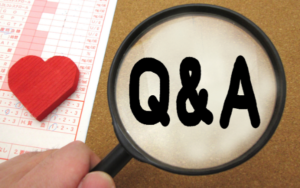 Buying life insurance can be daunting - we don't do it often enough to know the intricacies and can feel pressured to get it right, making it difficult to know how to choose life insurance. In this article, we'll answer common life insurance questions that help you choose the right life insurance for your needs and circumstances. We explain how life insurance payouts work, choosing the right amount and term for your life cover as well as choosing the best life insurance company. You will also find information to match your concerns with the right type of life insurance and how to ensure any life insurance claim money reaches the people you intend to benefit.
Buying life insurance can be daunting - we don't do it often enough to know the intricacies and can feel pressured to get it right, making it difficult to know how to choose life insurance. In this article, we'll answer common life insurance questions that help you choose the right life insurance for your needs and circumstances. We explain how life insurance payouts work, choosing the right amount and term for your life cover as well as choosing the best life insurance company. You will also find information to match your concerns with the right type of life insurance and how to ensure any life insurance claim money reaches the people you intend to benefit.
What can a life insurance payout be used for?
There are a variety of things people will want the money from life insurance to do if they die. Life insurance may be needed to:
- Pay off debts
- Fund the living costs of family or dependents
- Fund inheritance tax
- Pay for a funeral
It is important that you're clear about what you want to achieve so that the policy you choose doesn't fall short of your expectations. If you have multiple things you would like to cover with life insurance, you should speak to a specialist as there are ways to combine your wants and needs to find the most cost-effective life insurance.
How do I choose the right life insurance?
Choosing your life insurance starts with calculating how much money you need your life insurance to pay out to fund various parts of your life in case you die and when you die.
It is helpful to understand that there are two different kinds of life insurance to choose from:
- Term life insurance - this type of life insurance covers things you may want to leave money for if you die during your working life - family, debts, partners can fall into this category
- Whole life insurance - this type of life insurance covers things that you wish to fund when you die, whenever that happens - inheritance tax and the cost of funeral arrangements
How to choose life insurance for your mortgage
Mortgage life insurance is quite straightforward as long as you have the details of your mortgage. Simply check your mortgage statement for:
- The outstanding balance of your mortgage - your life insurance amount should match your mortgage balance if you would want it to be repaid in full if you died or choose an amount that would make the mortgage balance manageable for others
- The number of years until your mortgage is repaid - your life insurance should last as long as your mortgage will so that if you were to die at any point, the life insurance can cover any outstanding balance of the mortgage
- The type of mortgage - repayment or interest-only - you can choose a decreasing life insurance if you have a repayment mortgage so the amount of your life insurance reduces with your mortgage balance but you will likely need level term life insurance to cover an interest-only mortgage so that the life insurance amount stays the same just as your mortgage balance does not reduce
If you have a repayment mortgage you can choose a level life insurance or a decreasing life insurance as both will cover your mortgage - the level type of life insurance will provide you extra life cover as time goes on
You can read more choosing life insurance for a mortgage in our article, "Life insurance to pay off mortgage".
How to choose life insurance for your family
Choosing life insurance for your family depends on what your family will need in case you or your partner dies. Largely, family life insurance policies are arranged to prevent financial hardship that could be caused if you died prematurely.
It is helpful to picture your life if you or your partner were no longer in it and consider what changes will take place and what amount of money will be needed in order to fund the changes. Work out how much is needed to:
- Maintain your family's lifestyle - general living expenses including bills, food, holidays
- Provide childcare - if a carer dies, you may need to consider paying for childcare so work out how much this will cost
- Fund future expenses - you may wish to ensure there will be enough money to pay for things like university, weddings or other large expenses
Do remember to think about how the value of money changes over time. What you think will be enough today, might not be enough in 10 years. Consider index-linking your life insurance so that the potential payout increases with inflation. It will increase your monthly premium each year but the payout will increase too meaning the value won't be eroded by inflation over time.
You will find more detailed guidance for family life insurance in our article, "Family life insurance – Who should get it?".
How to choose life insurance to fund an inheritance tax bill
Simply calculate the likely inheritance tax (IHT) bill that will be payable against your estate when you die and remember that this may change if the value of your estate changes and/or the thresholds where IHT becomes payable change. Use our Inheritance tax calculator to work out how much your IHT bill may be.
You will find detailed information about life insurance to cover inheritance in our article, "Life insurance and Inheritance Tax".
How to choose life insurance to cover the cost of a funeral
Life insurance that covers the cost of a funeral is commonly advertised as a Funeral Plan or an Over 50s life insurance. These types of life insurance will cover you until you pass away and will usually pay a modest sum of money to cover the cost of a funeral, usually up to around £20,000.
Normally, these types of life insurance can be chosen by people over the age of 50 years old and do not usually require you to complete a medical questionnaire or examination. You can find more information
Choosing the length of your life insurance cover
The duration that a life insurance policy runs for can be anything from 1 year to the rest of your life. A term life insurance policy covers your life for a specific number of years and pays a claim if you die during those years. Choosing the right number of years or term, as it is called, for your policy is key.
For example, if your mortgage runs for another 25 years, the life insurance you choose to protect it should do the same. If there are 10 years left until your children are no longer financially dependent then your choice of family life insurance policy should run for 10 years.
First things, first - don't choose a term for your life insurance that is less time than the years you will need it for. People often think that they will simply buy more in the future when it runs out, mistakingly thinking that they will save money. While this might be cheaper in the short term, it will be more expensive as you get older and if your health changes along the way, you might even struggle to get more insurance.
On the other hand, a longer term will result in a higher premium, so buying life insurance for too long can mean you end up spending more than you need to. Sticking to the number of years that you need will also ensure that you stop paying for your insurance when you no longer need it.
Some people want to choose a longer term than they need and are happy to pay more for it. You might want the flexibility to cancel it if you don't need it anymore or continue it. As long as it is affordable and you understand that you're paying more for the flexibility, there's nothing wrong with this.
Remember that you can cancel your life insurance before it ends but you normally can't extend it without applying for a new policy.
If you are thinking of buying life insurance so that the payout can be used to fund any inheritance tax payable on your estate, then you'll probably need to look at a policy called 'whole of life' insurance, as these are policies that run until you die. This is a specialist area and you should take appropriate advice to ensure that you've calculated the correct sum for the inheritance tax that will be due and so that it is separated from your estate. A specialist life insurance adviser* can do this at no extra cost to you.
Choose the right type of life insurance
- Level Term Insurance - gives you a lump sum that stays the same throughout the period of time that you're insured. This means that if you die within the number of years you choose, the insurer pays out the set amount of money that you are insured for and this typically suits family, mortgage and debt life cover.
- Decreasing/Mortgage Life Insurance - pays out an amount of money that will reduce over time, usually in line with a repayment mortgage if you die within the policy term. It's usually only suited to cover a repayment mortgage.
- Family Income Benefit - pays out a set income each year from the point of the death claim until the end of the policy. It's a great solution for protecting your family or a partner as they may find the thought of a regular income over time easier to manage, rather than receiving a lump sum of money upfront. It's also easier to match the amount of life cover to what will maintain your family's lifestyle.
- Whole of Life Insurance - pays out a lump sum of money whenever you die. This type of insurance doesn't have an end date so it will eventually pay out. It's usually only needed if you want to make provisions for a potential inheritance tax bill upon your death. Sometimes, it can simply be used to leave a sum of money after you die. The fact that it will eventually pay out is reflected in the cost.
- Over 50s Life Insurance - pays out a lump sum of money when you die, however, some policies will not pay a death benefit if death occurs in the early years of the policy. This type of insurance is usually appealing to those who have health concerns because it doesn't ask about your health and this is reflected in the cost. It is often arranged in order to provide the money necessary to cover funeral costs.
What if I have life insurance through my employer?
Employers may or may not offer life insurance as part of your remuneration package and so it is definitely worth checking to see if you have any 'death-in-service' benefits. If you are not sure, check with your HR team as it should be listed in your benefits package. If you have a death-in-service benefit, then you can choose to view this one of two ways.
- You can rely on that life insurance to cover your needs and just top it up with a policy to cover any additional amount that you need. This will reduce the cost of your life insurance because some of it will be funded by your employer.
- You can see it as a bonus and arrange your life insurance as though you don't have your employer's life insurance. This will safeguard you if your employer removes the benefit or if you change jobs and lose your benefits as a result.
How will my life insurance money reach the people I intended it for?
If you buy life insurance and don't nominate the people you want the money to go to, it will simply be paid to your estate. Your estate will then be assessed through a process called 'probate', whereby your possessions, home, personal loans and other debts are evaluated to work out if they will be subject to inheritance tax, before being distributed to your intended beneficiaries. So, if you breach certain inheritance tax thresholds, the death benefit from your life insurance payout could potentially be reduced by 40%.
However, if you arrange a trust alongside your life insurance policy you can stipulate who you want to benefit with the money. You can even split the money the way that you wish between your beneficiaries to avoid any squabbles. The insurance company pays the death claim benefit to the trust instead of your estate and your appointed trustees will pass these monies onto your beneficiaries. Because the whole process bypasses your estate, the money isn't liable for inheritance tax so you can rest assured that all the money will reach your beneficiaries.
Choosing how much to spend on life insurance
Keep your life insurance within a monthly cost that is easily affordable to you. Speak to a specialist life insurance adviser and be upfront about what you want to spend. They'll help you to tailor your insurance so that you maximise your life insurance for what you can spend. If you can afford to pay more in the future you can look at it again.
Here are a few tips:
- Try to keep in mind that you'll probably be paying the price you agree to for the duration of the policy.
- It's not an investment, so you're not going to get the money back if you don't die during the term. (unless you've bought an investment-linked product)
- The older you get, the more expensive life insurance is and if your health changes this could affect how much you pay
- Prices are usually guaranteed for the duration of your policy
Choosing the right life insurance company for you
Here are a few things to look for when it comes to the company you choose to buy your life insurance with:
- Household brands - you may feel more comfortable buying from a brand that you recognise but remember that some specialist life insurance companies may not have the same marketing budgets as the big companies but still provide good options at competitive prices.
- Defaqto rating - issued in stars with 5 stars being the highest. This rates the quality of the product and the company you're buying from.
- Claims statistics - not all companies make these available but where they do, you can see what percentage of claims were paid and the reasons why some were not. (Remember that there will always be some claims that are declined because a small number of people don't tell the whole truth when they apply)
How to choose the best life insurance
The best life insurance for you will provide a level of cover that is affordable to you where the policy has a good Defaqto rating and track record in paying claims. Read our article "Best & cheapest life insurance in the UK" to compare life insurance policies, prices and quality.
How to choose the best life insurance at the best price
Having read this article, you may feel that you know enough to confidently choose life insurance for you and your family. However, it may also leave you feeling that there is a lot to consider and get right. You're not alone! Specialist life insurance advisory companies exist because many people need guidance to buy these sorts of products.
We would recommend that you speak to a life insurance specialist* to ensure you buy the best life insurance policy at the best price. An expert adviser will be able to talk you through the application process as well as provide you with invaluable regulated advice - that means that they have to take responsibility for the advice they give you. Additionally, you have the comfort of knowing that the people you are speaking to are not tied to any of the insurance companies and work with the whole market so they can choose what is best for you. Life insurance specialists provide advice that will allow you to set up the trust to go with your policy at no extra cost so that you can nominate your beneficiaries helping the right people get access to your life insurance claim money without delay or additional taxes to pay.
To arrange a call, simply complete this form* and they will be in touch. You'll also qualify for up to £100 cashback once you've arranged your policy.
If a link has an * beside it this means that it is an affiliated link. If you go via the link, Money to the Masses may receive a small fee which helps keep Money to the Masses free to use. This link can be used if you do not wish to help Money to the Masses and do not wish to qualify for the cashback referred to in the article




